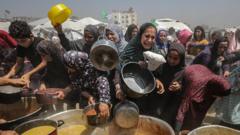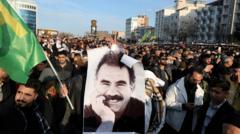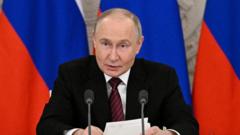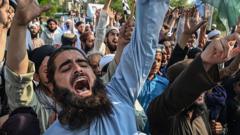In a historic development, the Kurdistan Workers' Party (P.K.K.) declared on Monday a resolution to cease armed conflict against the Turkish state, a move anticipated to have far-reaching implications across the region.
Kurdistan Workers' Party Announces End to Armed Conflict with Turkey

Kurdistan Workers' Party Announces End to Armed Conflict with Turkey
The P.K.K. pledges to disarm, signifying potential shifts in regional stability and Kurdish rights.
The announcement comes months after Abdullah Ocalan, the P.K.K.'s imprisoned leader, urged the group to disband its armed faction, stating the continuation of violence had surpassed its original intent. Established primarily as a secessionist entity with the goal of creating an independent Kurdish state, the P.K.K. has shifted focus towards advocating for increased rights for Kurdish communities within Turkey.
In their latest statement, the P.K.K. emphasized that it had articulated the Kurdish question to the extent that it could now be pursued through democratic channels, asserting that their mission had effectively reached its conclusion. They have proposed that Ocalan spearhead the demobilization process and called upon the Turkish Parliament to participate in the initiative.
This momentous shift could potentially terminate a protracted conflict that has resulted in over 40,000 deaths and greatly impact President Recep Tayyip Erdogan's political landscape. Moreover, the implications of this declaration may extend to various Kurdish factions in neighboring Syria, thereby reshaping regional tensions.
The Kurdish populace, numbering around 40 million and dispersed across Turkey, Syria, Iran, and Iraq, has long battled for recognition and autonomy, facing systemic repression of their linguistic and cultural identities across these nations.
While the exact ramifications for the P.K.K.’s hideouts in the mountainous regions of northern Iraq remain unclear, Turkish military operations in these areas have been ongoing. Although Turkish officials have claimed no territorial or political concessions were offered to facilitate the disarmament, leaders from Turkey's main pro-Kurdish party expressed optimism that governmental policies may evolve to enhance the cultural rights of Kurds.
Contributing reports by Safak Timur provide further insight into these developments.
In their latest statement, the P.K.K. emphasized that it had articulated the Kurdish question to the extent that it could now be pursued through democratic channels, asserting that their mission had effectively reached its conclusion. They have proposed that Ocalan spearhead the demobilization process and called upon the Turkish Parliament to participate in the initiative.
This momentous shift could potentially terminate a protracted conflict that has resulted in over 40,000 deaths and greatly impact President Recep Tayyip Erdogan's political landscape. Moreover, the implications of this declaration may extend to various Kurdish factions in neighboring Syria, thereby reshaping regional tensions.
The Kurdish populace, numbering around 40 million and dispersed across Turkey, Syria, Iran, and Iraq, has long battled for recognition and autonomy, facing systemic repression of their linguistic and cultural identities across these nations.
While the exact ramifications for the P.K.K.’s hideouts in the mountainous regions of northern Iraq remain unclear, Turkish military operations in these areas have been ongoing. Although Turkish officials have claimed no territorial or political concessions were offered to facilitate the disarmament, leaders from Turkey's main pro-Kurdish party expressed optimism that governmental policies may evolve to enhance the cultural rights of Kurds.
Contributing reports by Safak Timur provide further insight into these developments.






















